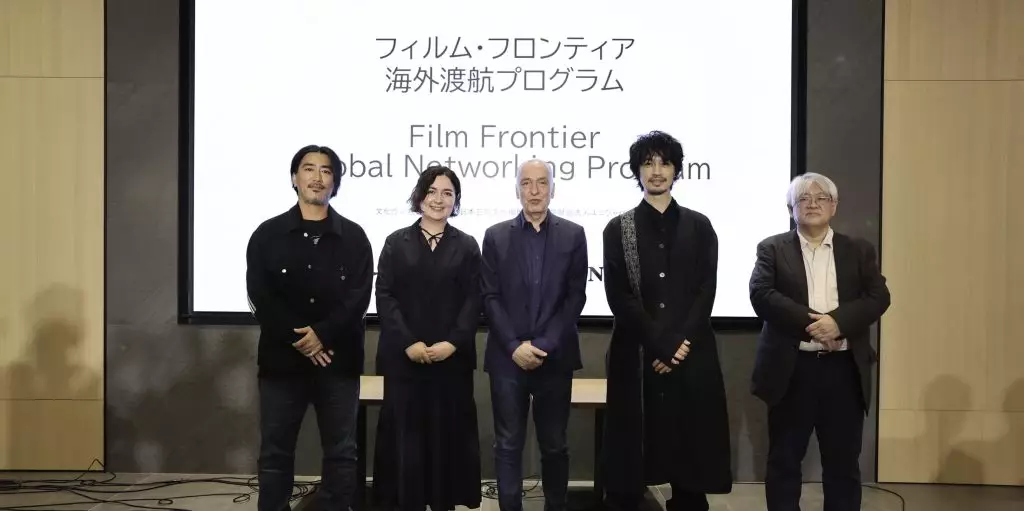In a pivotal move aimed at rejuvenating the Japanese film industry, Japan’s Agency for Cultural Affairs has introduced the Film Frontier Global Networking Program. This initiative, announced during the prestigious Tokyo International Film Festival (TIFF), sets out to equip emerging filmmakers with the skills necessary to navigate the increasingly globalized film landscape. By honing presentation abilities and expanding overseas networking opportunities, the program promises to elevate the visibility and international standing of Japanese cinema.
Managed by UniJapan, the organization responsible for the Tokyo International Film Festival, the Film Frontier program distinguishes itself by its commitment to nurturing not just talent but also ambition. The inaugural cohort consists of four filmmakers — Shingo Ota, Emma Kawawada, Kohki Hasei, and Mai Nakanishi — whose works have already begun to pique interest on both local and international platforms. The program will run for 18 months, from December 1, 2023, to May 31, 2026, with a subsequent cohort planned for the following year.
What stands out in this program is its focus on live-action filmmakers, although future rounds are set to involve animation talents, marking a comprehensive approach to various cinematic styles within Japan. The eligibility criteria stipulate that applicants must be Japanese nationals or permanent residents and have directed, produced, or written no more than three feature films. This strategic selection process is designed to foster fresh perspectives while ensuring that participants benefit from mentorship without being overshadowed by industry veterans.
Hirohiko Nakahara, a prominent official at the Agency for Cultural Affairs, underlined the government’s dedication to supporting the future of Japanese cinema and the aspirations of its young creatives. The acknowledgment of the artists’ potential is critical; fostering a nurturing environment where innovative ideas can flourish is essential for keeping the national industry relevant in competition with international filmmaking giants.
This sentiment was echoed by Shozo Ichiyama, TIFF’s Programming Director, who emphasized the festival’s enhanced focus on supporting nascent filmmakers. The recognition of ambition coupled with realism in their projects signifies an understanding that innovative storytelling requires not only creativity but also practical execution capabilities.
Networking as a Catalyst for Growth
A significant feature of this program is its emphasis on networking. Christian Jeune, the Cannes Film Festival’s film department head, shared insights into the importance of allowing filmmakers to interact freely, drawing from his experiences with the Cannes residency program. The freedom to pursue personal objectives without stringent controls creates an atmosphere conducive to creativity and collaboration. Networking is viewed not just as a functional tool but as a life-giving resource, offering filmmakers vital professional support in an industry known for its competitiveness.
The notion that filmmakers thrive on interactions with peers and mentors in a supportive setting is underscored by the experiences shared by Takumi Saitoh, actor and director. His recent participation in the Cannes Film Festival emphasized the richness of the exchanges fostered in such networking environments, highlighting the potential for creative growth through shared experiences and perspectives.
Despite the promising groundwork laid by the Film Frontier program, challenges remain. There is a notable gap in Japan’s support system for filmmakers throughout the creative process, something Saitoh pointed out during the discussion. Much like the residency programs offered internationally, Japan must remain proactive in cultivating an ecosystem that provides ongoing assistance to filmmakers, from the development of ideas to project realization and distribution.
As the first cohort embarks on their journey in December, the film community in Japan is watching closely. The success of this initiative could mark a transformative period for Japanese cinema, one that not only enhances its influence on a global scale but also revives a rich storytelling tradition that continues to resonate with audiences far and wide.
The Film Frontier Global Networking Program symbolizes hope and renewal for Japanese cinema, igniting possibilities for a new generation of filmmakers. As the program unfolds, the interplay of creativity, mentorship, and networking is poised to reshape the cinematic landscape, promising an exciting future for filmmakers in Japan and, potentially, the world. By investing in young talent today, we may witness the emergence of groundbreaking narratives that reflect both Japan’s unique culture and universal human experiences.

